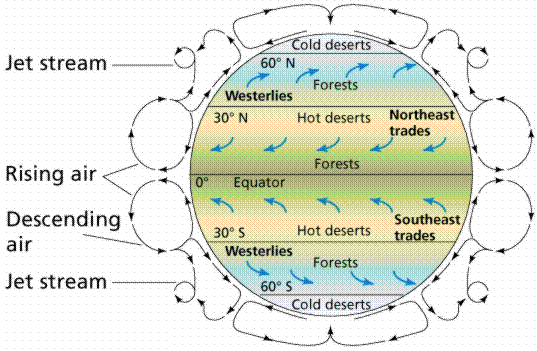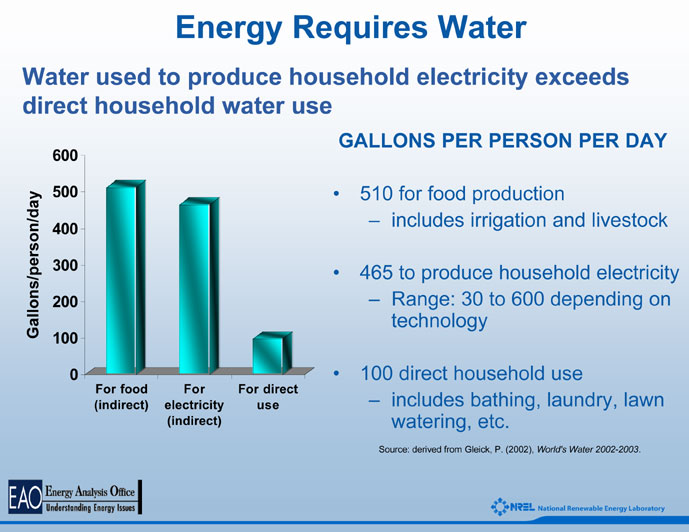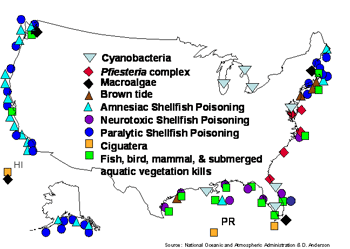Water is a greater treasure in its scarcity.
"They are the simple truth. . . . sad proof of the folly of our carelessness." 1
The truth of water being a treasure is best appreciated when anyone is thirsty. Florida persists in the desert belts of the world –such as the Mojave and Sonoran deserts– only because the large extent of the state acts as a million square mile sheet to capture the water and store it underground.
Florida lies between 30.3 and 24.5 degrees of latitude, north of the equator.
People and families need that water to drink, stay healthy cook and clean. Waters of lakes, rivers and beaches needs to be clean enough to swim and fish. We need the water for electricity and recreation.
As Americans we use thousands of gallons of water per person each day besides the 80 to 100 gallons of water we use personally for waste removal, washing, cleaning, laundry and cooking. So we need to conserve this necessary treasure in the best condition. But the hidden aspect of water-use is the need for electricity one of the keys to enormous levels consumer behavior that drives economic measures of commercial development.
The EPA water quality standards should not be replaced by less stringent state rules that would pollute our waters and give the resource away to the profiteers. Without water there is no Florida to sustain us and attract visitors who help to pay for our way of life. Water quality standards must be among the safest for us all if we are to prosper and endure.
More than other states, Florida with over 19 million people has contaminated springs, rivers, and estuaries now that are in need of restoration. This is not the time to let the special interests further degrade our water quality standards.
Water in which it is able for people to:
¥ fish
¥ swim
¥ drink
Astute scientists have long recognized the impact of too many people polluting the water due to waste disposal, toxic contamination, and excessive run-off from streets and urban yards.
Michael Faraday wrote this letter about the sewage in the Thames River, 1855.
I fear it is rapidly becoming the general condition. If we neglect this subject, we cannot expect to do so with impunity; nor ought we to be surprised if, ere many years are over, a season give us sad proof of the folly of our carelessness.
Sir,
ÑI traversed this day by steamboat the space between London and Hungerford Bridges, between half-past one and two o'clock. It was low water, and I think the tide must have been near the turn. The appearance and smell of the water forced themselves at once on my attention. The whole of the river was an opaque pale brown fluid. In order to test the degree of opacity, I tore up some white cards into pieces, and then moistened them, so as to make them sink easily below the surface, and then dropped some of these pieces into the water at every pier the boat came to. Before they had sunk an inch below the surface they were undistinguishable, though the sun shone brightly at the time, and when the pieces fell edgeways the lower part was hidden from sight before the upper part was under water.
This happened at St. Paul's Wharf, Blackfriars Bridge, Temple Wharf, Southwark Bridge, and Hungerford, and I have no doubt would have occurred further up and down the river. Near the bridges the feculence rolled up in clouds so dense that they were visible at the surface even in water of this kind.
The smell was very bad, and common to the whole of the water. It was the same as that which now comes up from the gully holes in the streets. The whole river was for the time a real sewer. Having just returned from the country air, I was perhaps more affected by it than others; but I do not think that I could have gone on to Lambeth or Chelsea, and I was glad to enter the streets for an atmosphere which, except near the sink-holes, I found much sweeter than on the river.
I have thought it a duty to record these facts, that they may be brought to the attention of those who exercise power, or have responsibility in relation to the condition of our river. There is nothing figurative in the words I have employed, or any approach to exaggeration. They are the simple truth.
If there be sufficient authority to remove a putrescent pond from the neighbourhood of a few simple dwellings, surely the river which flows for so many miles through London ought not to be allowed to become a fermenting sewer. The condition in which I saw the Thames may perhaps be considered as exceptional, but it ought to be an impossible state; instead of which, I fear it is rapidly becoming the general condition. If we neglect this subject, we cannot expect to do so with impunity; nor ought we to be surprised if, ere many years are over, a season give us sad proof of the folly of our carelessness.
I am, Sir, your obedient servant,
M. Faraday.
3 January 1855
Letter to the London Times.
The Florida state Legislature (2015) listens only to the powerful special interests and not only was Senate Bill 1808 written to incorporate many of the worst parts of House Bill 7115 including a new amendment that strikes a major blow against sound resource management and water conservation.
Thanks to those who had called your state representative and senator today and tell them to defeat these bills SB 1808 and HB 7115.
Joseph V. Siry, Ph.D.
author of Marshes of the Ocean Shore: Development of an Ecological Ethic
College professor since 1972.



